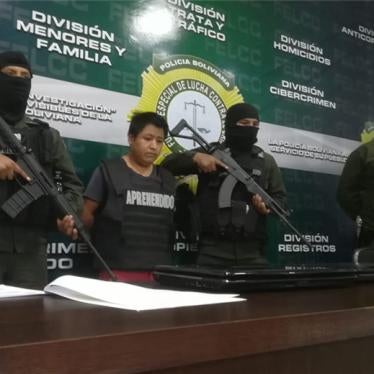The military commission proceedings against the first four detainees at Guantanamo Bay were mired in confusion because of fundamentally flawed legal procedures and inadequate interpreters, Human Rights Watch said today.
The military commissions, held in a makeshift court house atop a hill overlooking Guantanamo Bay, began on Tuesday, August 24.
Despite the laudable professionalism of military officials throughout this week's military commissions, Human Rights Watch called on the U.S. government to institute a process that would ensure competent, independent and impartial trials consistent with U.S. and international standards.
"The commissions got off to a chaotic start, with deep confusion about the process, concerns of bias among panel members, and grossly inadequate interpreters," said Sam Zia-Zarifi, Human Rights Watch's observer at Guantanamo Bay. “Some military lawyers and officers have been put in the impossible position of trying to wring justice from a basically unfair system."
The first four days of proceedings highlighted the structural problems predicted by legal observers. Among the most significant concerns were:
- The absence of an independent review process outside the military chain of command;
- Rules of evidence that are stacked against the defendants; and
- Designation of commission panel members with little legal experience to decide complicated issues of military, U.S., and international law.
Compounding these problems was a series of inadequacies that should be immediately addressed. Most notable were the significant interpretation failures that undermined the credibility of the week’s proceedings. Three of the accused are Arabic-speakers, and the interpreters were incapable of conveying their statements properly for the court. In addition, the military had not yet provided the assigned military defense lawyers with sufficient staff and resources.
Moreover, serious questions emerged about the appearance of bias among members of the military commission. The presiding officer’s close friendship with the appointing authority, who is empowered to review the presiding officer’s determinations, also raised doubts about the process’s impartiality. The presiding officer is the only member of the five-person commission with any legal training, and is responsible for providing basic rulings in the cases and guiding the process. Some commission members apparently also had direct intelligence or operational responsibilities over detainees, including some of the defendants, which might impede impartial deliberation.







